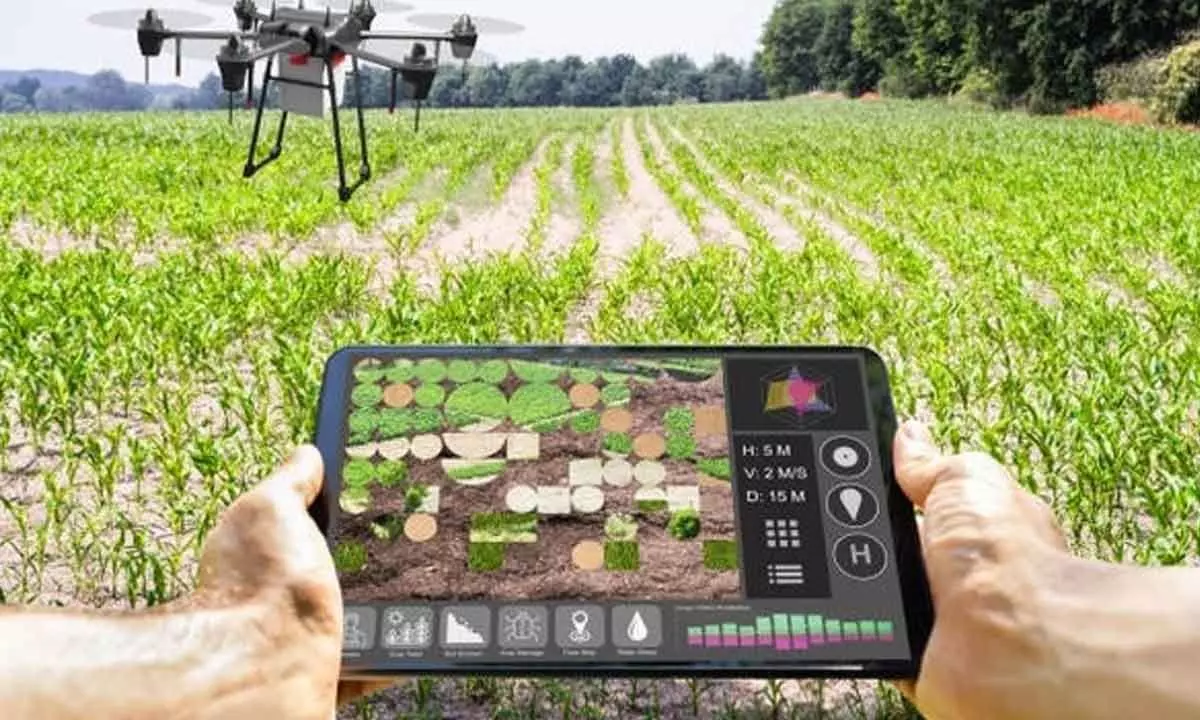How modern tech is making farmers richer, crops greener
The tech revolution is giving farmers a bird's eye view of their fields, allowing them to monitor crops, target pests, and use resources more efficiently
image for illustrative purpose

Data-driven decisions are leading to higher yields, less waste, and a more sustainable future for agriculture
The face of farming is changing rapidly in today's time. Gone are the days when farmers had to solely rely on traditional methods and gut instincts.
With the advent of new technologies, agriculture is undergoing a drastic transformation, paving the way for a more efficient, sustainable, and productive future. At the forefront of this technological revolution are drones, satellite imaging, and Internet of Things (IoT) sensors. These powerful tools work in tandem, providing farmers with a bird's eye view of their fields and precise monitoring capabilities. Drones equipped with advanced sensors can detect pests, monitor crop health, measure soil moisture levels, and even identify nutrient deficiencies – all in real-time.
Talking to Bizz Buzz, Pradeep Palelli, founder and chief executive officer (CEO) of Thanos Technologies says, “Automation plays a significant role too. Automated drone flights and data analysis streamline farm operations, reducing the need for manual labour and freeing up farmers' time for more strategic tasks. Actionable insights empower them to make timely interventions and crop management adjustments, ensuring their crops thrive and their efforts bear fruit. Ultimately, the integration of technology in agriculture promotes sustainable farming practices by minimizing environmental impacts and conserving resources.”
As agri-drone capabilities continue to advance, innovation in agricultural technology will shape a more sustainable future for farming in Viksit Bharat, boosting productivity and ensuring food security for generations to come.
Mayur Mhapankar, Senior Manager, Technology Research and Advisory, Aranca says, “Technology is revolutionising modern farming practices in India, enhancing efficiency, productivity, and sustainability across the agricultural sector. Innovations such as precision agriculture, drone technology, and IoT-enabled farming solutions empower farmers to optimize resource utilization, monitor crop health, and make data-driven decisions.”
Startups like CropIn and Ninjacart provide digital platforms for crop monitoring, pest management, and access to agricultural inputs and advisory services. Additionally, companies like DeHaat and Ergos focus on digitizing the agricultural supply chain, connecting farmers directly to buyers and offering storage and credit facilities. National policies like the National Agricultural Policy and Digital India program further drive technology adoption in agriculture. Moving forward, emphasis will be on developing robust connectivity infrastructure in rural areas and frameworks for ensuring data privacy and cybersecurity in the Indian agriculture sector.
Harsh Vardhan Bhagchandka, President IPL Biologicals says, “It's evident that the current era is witnessing a significant shift towards more sustainable practices driven by increasing environmental awareness and adoption of technologies even from small and marginal growers.”
Recent studies, such as the one conducted by Statista in 2023, reveal a growing demand for eco-friendly and responsibly produced products, with 60 per cent of buyers expressing a preference for such options. This trend underscores the importance of adopting environmentally conscious lifestyles and practices to promote sustainability.
Aligned with this overarching trend, the agricultural sector has embraced environmentally sound products, with a notable emphasis on the inclusion of microbial solutions as an integral part of organic farming. Organically grown produce exclude the use of synthetic fertilizers and pesticides, and prioritizes natural beneficial and techniques to meet nutrition and management of pests, preserving ecological balance. Amidst challenges posed by climate change, including erratic weather patterns and heightened environmental stresses, microbial solutions emerging as a crucial component of climate-smart agriculture.
By incorporating sustainable practices such as crop rotation, composting, and natural pest control, modern farming not only fosters soil health but also reduces farmers' reliance on expensive chemical inputs. Eco-friendly technologies not only benefit the environment but also enhance farmers' financial resilience and potentially boost their income levels.

